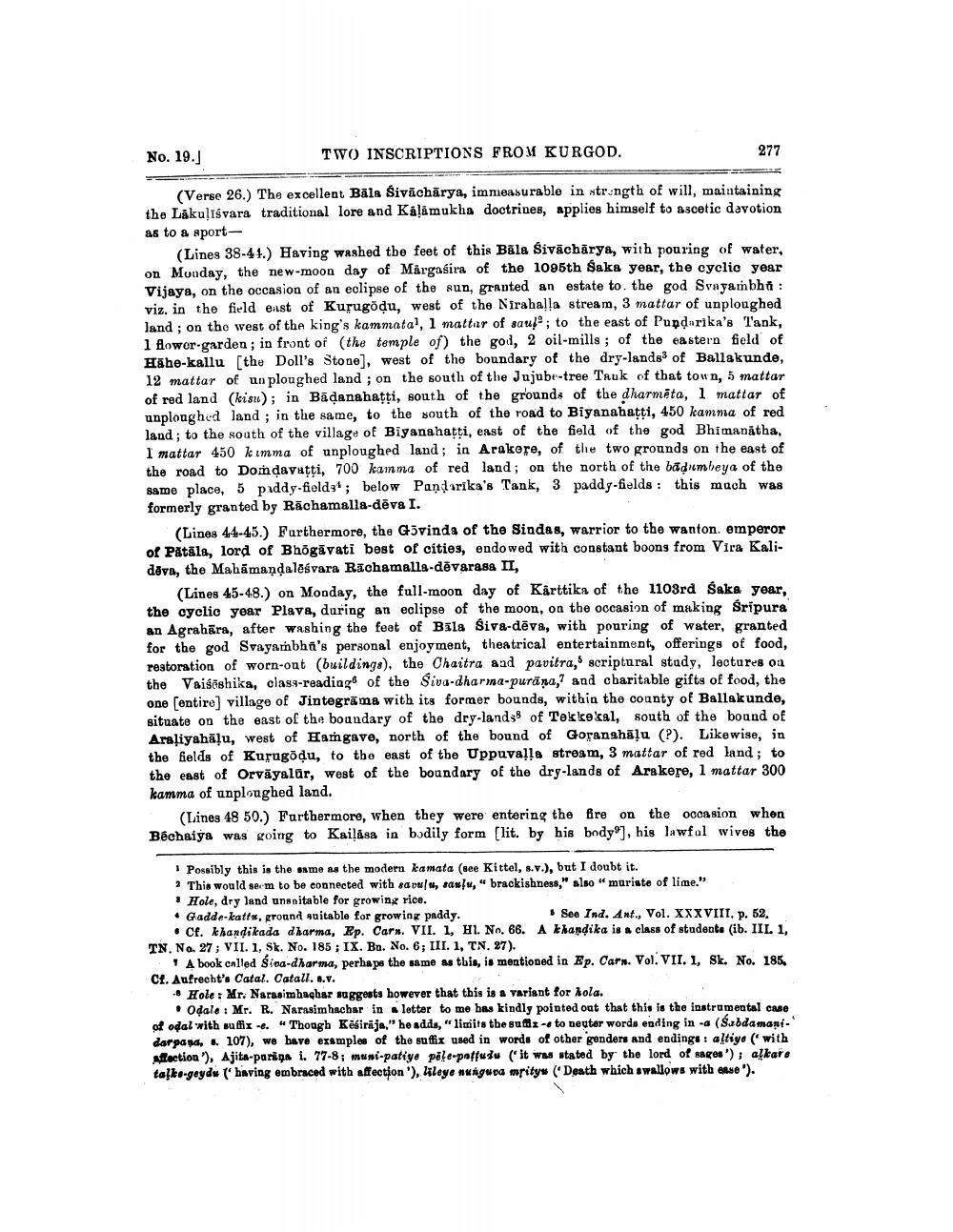________________
No. 19.J
TWO INSCRIPTIONS FROM KURGOD.
(Verse 26.) The excellent Bala Sivacharya, immeasurable in strength of will, maintaining the Lakulisvara traditional lore and Kalamukha doctrines, applies himself to ascetic devotion as to a sport
277
(Lines 38-41.) Having washed the feet of this Bala Sivacharya, with pouring of water, on Monday, the new-moon day of Margasira of the 1095th Saka year, the cyclic year Vijaya, on the occasion of an eclipse of the sun, granted an estate to the god Svayambhu : viz. in the field east of Kurugöḍu, west of the Nirahalla stream, 3 mattar of unploughed land; on the west of the king's kammata1, 1 mattar of saul; to the east of Pundarika's Tank, 1 flower-garden; in front of (the temple of) the god, 2 oil-mills; of the eastern field of Hähe-kallu [the Doll's Stone], west of the boundary of the dry-lands3 of Ballakunde, 12 mattar of un ploughed land; on the south of the Jujube-tree Tauk of that town, 5 mattar of red land (kisu); in Badanahatti, south of the grounds of the dharmēta, 1 mattar of unploughed land; in the same, to the south of the road to Biyanahaṭṭi, 450 kamma of red land; to the south of the village of Biyanahaṭṭi, east of the field of the god Bhimanatha, I mattar 450 kimma of unploughed land; in Arakere, of the two grounds on the east of the road to Domdavaṭṭi, 700 kamma of red land; on the north of the badumbeya of the same place, 5 paddy-fields; below Pandarika's Tank, 3 paddy-fields: this much was formerly granted by Rachamalla-dēva I.
(Lines 44-45.) Furthermore, the Govinda of the Sindas, warrior to the wanton. emperor of Pätäla, lord of Bhōgavati best of cities, endowed with constant boons from Vira Kalideva, the Mahamanḍalēsvara Rachamalla-devarasa II,
(Lines 45-48.) on Monday, the full-moon day of Karttika of the 1103rd Saka year, the cyclic year Plava, during an eclipse of the moon, on the occasion of making Sripura an Agrahara, after washing the feet of Bila Siva-deva, with pouring of water, granted for the god Svayambha's personal enjoyment, theatrical entertainment, offerings of food, restoration of worn-out (buildings), the Chaitra and pavitra, scriptural study, lectures on the Vaiseshika, class-reading of the Siva-dharma-purana, and charitable gifts of food, the one [entire] village of Jintegrama with its former bounds, within the county of Ballakunde, situate on the east of the boundary of the dry-lands8 of Tekkekal, south of the bound of Araliyahāļu, west of Hamgave, north of the bound of Goranahāļu (?). Likewise, in the fields of Kurugōdu, to the east of the Uppuvalla stream, 3 mattar of red land; to the east of Orvayalür, west of the boundary of the dry-lands of Arakere, 1 mattar 300 kamma of unploughed land.
(Lines 48 50.) Furthermore, when they were entering the fire on the occasion when Béchaiya was going to Kailasa in bodily form [lit. by his body], his lawful wives the
1 Possibly this is the same as the modern kamata (see Kittel, s.v.), but I doubt it.
2 This would seem to be connected with savulu, saulu," brackishness," also "muriate of lime."
Hole, dry land unsuitable for growing rice. Gadde-kattu, ground suitable for growing paddy.
See Ind. Ant., Vol. XXXVIII, p. 52.
Cf. khandikada dharma, Ep. Carn. VII. 1, H1. No. 66. A khandika is a class of students (ib. III. 1, TN. No. 27; VII. 1. Sk. No. 185; IX. Bn. No. 6; III. 1, TN. 27).
A book called Siea-dharma, perhaps the same as this, is mentioned in Ep. Cars. Vol. VII. 1, Sk. No. 185, Cf. Aufrecht's Catal. Catall. 8.v.
Hole: Mr. Narasimhachar suggests however that this is a variant for hola.
Odale: Mr. R. Narasimhachar in a letter to me has kindly pointed out that this is the instrumental case of odal with suffix -e. "Though Késiraja," he adds, "limits the suffix-e to neuter words ending in -a (Sabdamanidarpana, s. 107), we have examples of the suffix used in words of other genders and endings: altiye (with affection'), Ajita-pariga i. 77-8; muni-patiye pele-pattudu (it was stated by the lord of sages'); alkare talke-geydu ('having embraced with affection '), lileye nunguva mrityu ('Death which swallows with ease").




